

Meridians. I had the question come up, why do I talk about (or write about) the meridians? Do I believe they actually exist. Also, do I believe in the five elements and yin and yang? To me they are models, metaphors, tools for analysis and understanding. Education. Mantak Chia. Universal Healing Tao Article: Inner Smile and Six Healing Practices. Inner Smile and Six Healing Sounds Practices As taught by Master Mantak Chia, Universal Healing Tao Center and Tao Garden Thailand In the Taoist tradition, positive and negative emotions are associated with the internal organs.
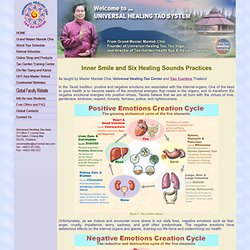
One of the keys to good health is to become aware of the emotional energies that reside in the organs, and to transform the negative emotional energies into positive virtues. Taoists believe that we are all born with the virtues of love, gentleness, kindness, respect, honesty, fairness, justice, and righteousness. Figure 1. Unfortunately, as we mature and encounter more stress in our daily lives, negative emotions such as fear, anger, cruelty, impatience, worry, sadness, and grief often predominate. Figure 2. In the Tao "emotional intelligence" is a process of recognizing emotions by their effects on the body, and employing exercises that transform the negative emotions into positive life force, or Chi.
Table 1. Inner Smile Practice Front Line 1. 2. 3. 4. 5. 6. Universal Healing Tao Article: Six Healing Sound. Just about everybody in the modern world has to deal with some sort of stress.
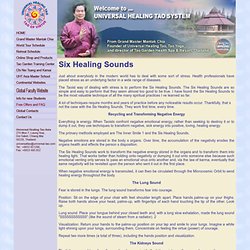
Health professionals have placed stress as an underlying factor in a wide range of diseases. The Taoist way of dealing with stress is to perform the Six Healing Sounds. The Six Healing Sounds are so simple and easy to perform that they seem almost too good to be true. I have found the Six Healing Sounds to be the most valuable technique of all the many spiritual practices I ve learned so far. A lot of techniques require months and years of practice before any noticeable results occur.
Recycling and Transforming Negative Energy Everything is energy. The Eight Extraordinary Vessels. The eight extraordinary vessels of the traditional chinese medicine system, also known as the 8 strange flows and the 8 psychic channels, represents the underlying root of all the body’s energy systems.
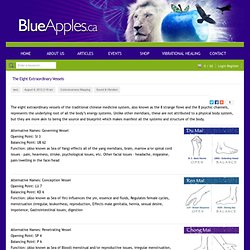
Unlike other meridians, these are not attributed to a physical body system, but they are more akin to being the source and blueprint which makes manifest all the systems and structure of the body. Alternative Names: Governing Vessel Opening Point: SI 3 Balancing Point: UB 62 Function: (Also known as Sea of Yang) effects all of the yang meridians, brain, marrow a/or spinal cord issues – pain, heaviness, stroke, psychological issues, etc. Large Intestine Meridian. Large intestine: Metal-energy yang organ The large intestine is called the 'Minister of Transportation'.
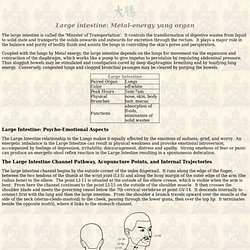
It controls the transformation of digestive wastes from liquid to solid state and transports the solids onwards and outwards for excretion through the rectum. It plays a major role in the balance and purity of bodily fluids and assists the lungs in controlling the skin's pores and perspiration. Sujok Acupuncture - Acupressure - India - Homepage. "The Ten Questions" Clinical Questioning in TCM Acupuncture Theory. Many people new to acupuncture may ask, "Why does my acupuncturist ask so many questions?
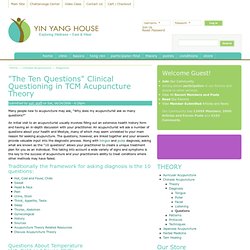
" An initial visit to an acupuncturist usually involves filling out an extensive health history form and having an in-depth discussion with your practitioner. An acupuncturist will ask a number of questions about your health and lifestyle, many of which may seem unrelated to your main reason for seeking acupuncture. The questions, however, are linked together and your answers provide valuable input into the diagnostic process. Along with tongue and pulse diagnosis, asking what are known as the "10 questions" allows your practitioner to create a unique treatment plan for you as an individual.
This taking into account a wide variety of signs and symptoms is the key to the success of acupuncture and your practitioners ability to treat conditions where other methods may have failed. Foundations for integrative ...
Tai Yang, Shao Yang, YangMing, Tai Yin, etc. Liver - Differentiation of Syndromes @ Traditional Chinese Medicine Basics (TCMBasics.com) - Resources, Herbs Wholesale, Materia Medica. Introduction to TCM Basics of TCM • Yin-Yang | Five Elements Zang-Fu Theories.
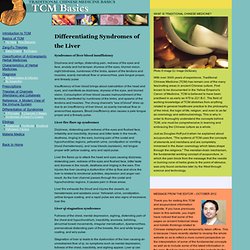
Jin Shin. The fascia/tendon/ligament system, or the Qi substrate « (內家拳 Nei Jia Chuan) August 15, 2008 by richard.
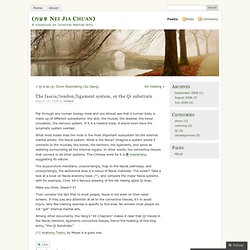
TCM Dampness and Food Therapy. By Edward F.
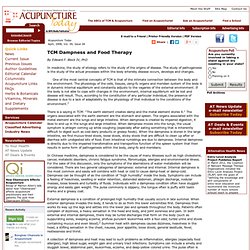
XinYi LiuHe Quan. Chi. Li Ching-Yuen. Li Ching-Yuen or Li Ching-Yun (simplified Chinese: 李清云; traditional Chinese: 李清雲; pinyin: Lǐ Qīngyún; died May 6, 1933) was a Chinese herbalist who supposedly lived to be over 256 years old.
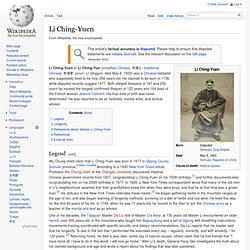
He claimed to be born in 1736, while disputed records suggest 1677. Both alleged lifespans of 197 and 256 years far exceed the longest confirmed lifespan of 122 years and 164 days of the French woman Jeanne Calment. His true date of birth was never determined. He was reported to be an herbalist, martial artist, and tactical advisor.